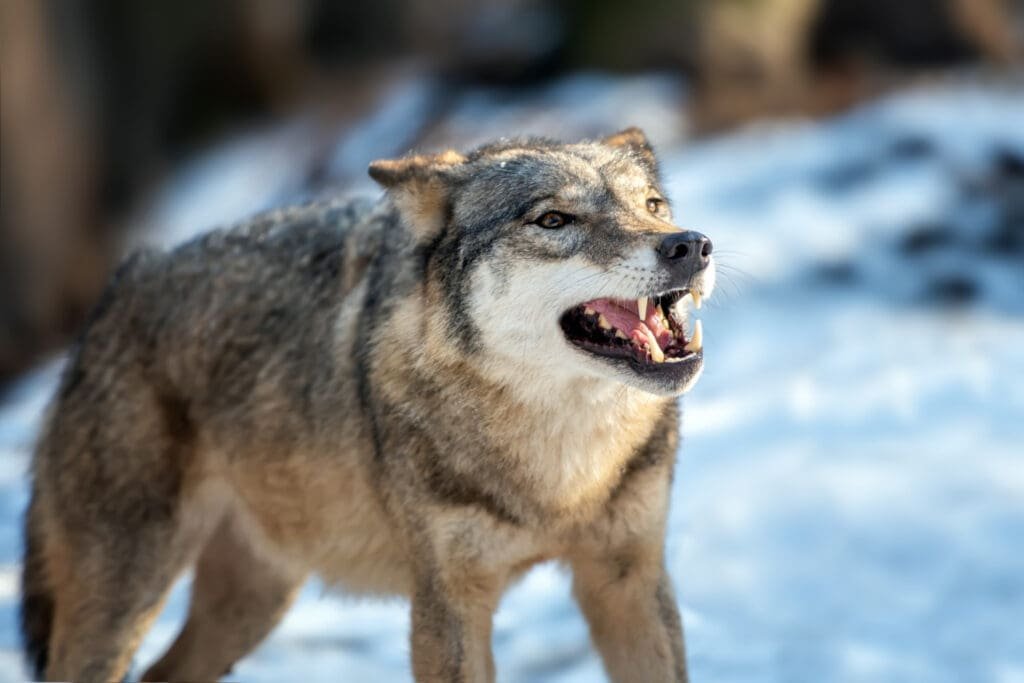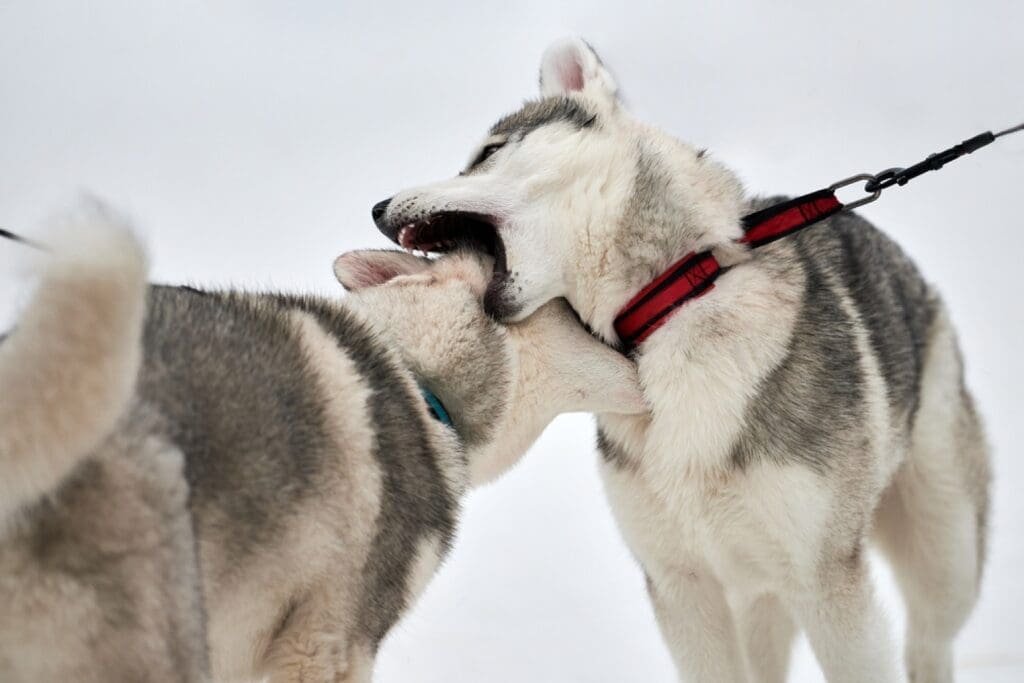Table of Contents
Are Siberian Huskies aggressive by nature? This is a question that many potential husky owners have. Known for their stunning looks and incredible sled-pulling abilities, Siberian Huskies are often misunderstood when it comes to their temperament. In this article, we will delve into the true nature of these beautiful dogs and explore whether or not aggression is a common characteristic.

Common misconceptions about Siberian Huskies
Siberian Huskies have gained a reputation for being aggressive dogs, but this stereotype is largely unfounded. One common misconception about huskies is that they are inherently aggressive due to their resemblance to wolves. While huskies do share some physical traits with wolves, it is important to remember that they have been domesticated for centuries and have distinct temperaments. Generalizing their behavior based on appearance alone is unfair and misleading.
Another misconception is that huskies are dangerous around small children or other pets. While it is true that huskies have a high prey drive, this does not automatically translate into aggression toward children or other animals. Proper socialization and training can help minimize any potential issues and ensure that huskies coexist peacefully with other members of the family.
Understanding The Nature of Siberian Huskies
To truly understand the nature of Siberian Huskies, it is important to explore their history and heritage. Originally bred by the Chukchi people of northeastern Siberia, these dogs were not only companions but also vital for transportation and survival in harsh Arctic conditions. The selective breeding process focused on traits such as endurance, athleticism, and the ability to work as part of a team. Aggression was not a desirable trait in these working dogs, as it would hinder their ability to collaborate effectively with humans and other dogs.
As a result, Siberian Huskies have developed a temperament that is generally friendly, sociable, and gentle. They are known for their playful and mischievous nature, making them great family dogs. However, it is important to note that individual huskies can still exhibit aggressive behaviors, just like any other dog breed. These behaviors are often a result of factors such as genetics, socialization, and training.
Factors That Can Contribute To Aggression In Siberian Huskies
While aggression is not a common characteristic of Siberian Huskies, there are certain factors that can contribute to aggressive behavior in individual dogs. One of the primary factors is genetics. Like all dog breeds, huskies have certain genetic predispositions that can influence their behavior. It is important to note that aggression is not a breed-specific trait but can be influenced by the individual dog’s genetic makeup.
Another factor that can contribute to aggression is a lack of proper socialization. Siberian Huskies, like any other breed, need to be exposed to a variety of people, animals, and environments from a young age. This helps them develop confidence, learn appropriate behaviors, and become well-adjusted adults. A lack of socialization can lead to fear, anxiety, and aggression in huskies, as they may perceive unfamiliar situations or individuals as threats.
Training is another crucial factor in preventing aggression in Siberian Huskies. Consistent and positive training methods, such as reward-based training, can help establish clear boundaries and expectations for the dog. Huskies are intelligent and independent dogs, so they respond best to training that is fun, and engaging and reinforces positive behaviors. A lack of training or the use of harsh punishment can lead to frustration, fear, and even aggression in these dogs.

How To Properly Train and Socialize a Siberian Husky
Proper training and socialization are key to raising a well-behaved and balanced Siberian Husky. Starting early is crucial, as puppies are most receptive to learning and new experiences during their first few months of life. Here are some tips for training and socializing your husky:
Positive reinforcement: Use rewards such as treats, praise, and playtime to encourage desired behaviors. Huskies respond well to positive reinforcement and are eager to please when they are rewarded for their good behavior.
- Consistency: Establish clear rules and boundaries for your husky and ensure that everyone in the household follows them consistently. Inconsistency can confuse the dog and lead to behavioral problems.
- Socialization: Expose your husky to different people, animals, and environments from a young age. Gradually increase the level of exposure to help your dog become comfortable and confident in various situations.
- Obedience training: Teach your husky basic obedience commands such as sit, stay, and come. This not only helps in controlling their behavior but also strengthens the bond between you and your dog.
- Patience and persistence: Training a husky requires patience and persistence. These dogs can be stubborn at times, so it is important to stay calm, consistent, and positive throughout the training process.
Recognizing Signs of Aggression in Siberian Huskies
While aggression is not a common trait in Siberian Huskies, it is important for owners to be able to recognize the signs of aggression to ensure the safety of everyone involved. Some common signs of aggression in huskies include:
- Growling and Snarling: Huskies may growl or snarl when they feel threatened or challenged.
- Showing Teeth: Bared teeth are a clear sign of aggression or a warning signal from a husky.
- Stiff body Language: A husky displaying stiff body language with raised fur and a tense posture may be on the verge of aggression.
- Lunging or Snapping: If a husky lunges or snaps towards someone or something, it is a clear sign of aggression and should be taken seriously.
- Resource Guarding: Huskies may exhibit aggression when they feel their resources, such as food or toys, are being threatened or taken away.
Tips For Preventing and Managing Aggression in Siberian Huskies
Preventing and managing aggression in Siberian Huskies requires a proactive approach and consistent training. Here are some tips to help prevent and manage aggression in your husky:
- Early socialization: Start socializing your husky from a young age to ensure they are comfortable around different people, animals, and environments.
- Positive reinforcement: Use positive reinforcement techniques to reward good behavior and discourage aggressive behavior.
- Avoid punishment: Avoid using harsh punishment or physical force as it can escalate aggression and damage the trust between you and your husky.
- Seek professional help: If your husky shows signs of aggression that you are unable to manage on your own, seek the help of a professional dog trainer or behaviorist.
- Provide mental and physical stimulation: Keeping your husky mentally and physically stimulated can help prevent boredom and frustration, which can contribute to aggressive behaviors.
The Importance of Responsible Ownership and Breed Education
Owning any dog breed comes with responsibilities, and Siberian Huskies are no exception. It is essential for potential owners to educate themselves about the breed’s characteristics, needs, and potential challenges before bringing a husky into their lives. Responsible ownership involves:
- Researching The Breed: Learn about the breed’s history, temperament, exercise requirements, and potential health issues to ensure you are well-prepared for owning a husky.
- Providing proper care: Meet your husky’s physical, mental, and emotional needs by providing a balanced diet, regular exercise, mental stimulation, and plenty of love and attention.
- Committing to training: Invest time and effort into training and socializing your husky to ensure they become a well-behaved and balanced member of your family.
- Spaying or neutering: Consider spaying or neutering your husky, as it can help reduce certain behavioral issues and contribute to their overall health and well-being.
- Being a responsible ambassador: Represent the breed positively by being a responsible owner and educating others about the true nature of Siberian Huskies.
Myths and truths about Siberian Huskies’ aggression
Now that we have explored the nature of Siberian Huskies and aggression, let’s debunk some common myths and highlight the truths about this breed:
Myth: Siberian Huskies are aggressive by nature.
Truth: Aggression is not a common characteristic of Siberian Huskies. While individual huskies may exhibit aggression, it is not representative of the breed as a whole.
Myth: Huskies are dangerous around small children and other pets.
Truth: Proper socialization and training can help huskies coexist peacefully with children and other animals. With the right guidance, huskies can be loving and gentle family dogs.
Myth: Huskies are unpredictable and cannot be trusted.
Truth: Like any dog breed, huskies thrive in a stable and consistent environment. With proper training, socialization, and responsible ownership, huskies can be reliable and trustworthy companions.
Final Thoughts on Are Siberian Huskies Aggressive
In conclusion, Siberian Huskies are not inherently aggressive by nature. While individual huskies may exhibit aggressive behaviors, it is important to remember that aggression is not the norm for the breed as a whole. Proper socialization, training, and responsible ownership play a significant role in shaping a husky’s behavior and ensuring they become loving and loyal family members.
By debunking myths and offering insights into the true nature of Siberian Huskies, we hope to encourage a better understanding and appreciation for this captivating breed. So, if you’re considering adding a husky to your family, rest assured that with the right care and attention, you can enjoy a wonderful companionship with these beautiful dogs.
